Belief: A Theological Commentary on the Bible (7 vols.)
Digital Logos Edition
Overview
The volumes in Belief: A Theological Commentary on the Bible, from Westminster John Knox Press, offer a fresh and invigorating approach to seven significant the books of the Bible. Building on a wide range of sources from biblical studies, the history of theology, the church’s liturgical and musical traditions, contemporary culture, and the Christian tradition, noted scholars focus less on traditional historical and literary angles and more on a theologically focused commentary that considers the contemporary relevance of the texts. This series is an invaluable resource for those who want to probe beyond the backgrounds and words of biblical texts to their deep theological and ethical meanings for the church today.
The Logos edition makes this resource even more relevant, saving you time and strengthening your study. Clicking any Scripture reference links you directly to your preferred translation for easier side-by-side analysis. Perform comprehensive searches by topic to add new depth to your sermon research and personal study.

Key Features
- Various theological perspectives from prominent scholars
- Fresh commentaries for the modern church
Praise for the Print Edition
Intentionally theological in interpretation, Belief: A Theological Commentary on the Bible is extraordinary, inspiring, innovative, and passionate for Christ in its vision. Its priority is not interpreting the Scriptures from historical-critical perspectives of biblical scholarship but providing theological interpretations for building up the church of Jesus Christ. Written with pastors in mind, this series is an excellent resource for discerning the intention of the Holy Spirit through the Scriptures and for preaching the love of God.
—Andrew Sung Park, professor of theology, United Theological Seminary
Surely, Belief will assist pastors, laypersons, and scholars both in reading the Bible better and in doing better theology for decades to come.
—Cynthia Rigby, W.C. Brown Professor of Theology, Austin Presbyterian Theological Seminary
Product Details
- Title: Belief: A Theological Commentary on the Bible
- Editors: William C. Placher and Amy Plantinga Pauw
- Publisher: Westminster John Knox
- Volumes: 7
- Pages: 2,192
Individual Titles
- Genesis by Miguel A. De La Torre
- Lamentations and the Song of Songs by Harvey Cox and Stephanie Paulsell
- Mark by William C. Placher
- Luke by Justo L. González
- Ephesians by Allen Verhey and Joseph S. Harvard
- Hebrews by D.Stephen Long
- 1 & 2 Peter and Jude by Catherine Gunsalus González
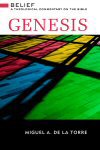
This volume in the Belief series provides a new and interesting theological interpretation of Genesis through the themes of liberation and the concerns of the poor and marginalized. De La Torre remembers Jacob’s wrestling at Peniel (Gen. 32:24–32), and finds that “there are consequences when we truly wrestle with the biblical text, struggling to see the face of God.” This commentary provides theological and ethical insights that enables the book of Genesis to speak powerfully today.
Miguel A. De La Torre is a professor of social ethics and Latino/a studies at the Iliff School of Theology in Denver, Colorado, and the author of more than 25 books. He is the 2012 president of the Society of Christian Ethics.
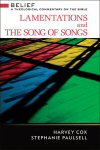
This volume considers two very different types of biblical writings and two very timely subjects—violence and sex. Well-known theologian Harvey Cox draws on a wide array of sources in his commentary on Lamentations—including poetry, novels, films, paintings, and photography—to offer a contemporary theological reading that is provocative and sure to stir numerous reflections and responses.
The biblical book of Song of Songs has historically been seen as a book pointing to Christ’s love for the church and has been interpreted in allegorical ways. Yet, it is unique in the canon for its use of erotic poetry, celebrating the human body and human love in graphic terms. Author Stephanie Paulsell suggests that the Song can still have profound meaning for us, teaching us “to love not only what we can see shining on the surface but also those depths of the other which are out of our reach.”
Harvey Cox is retired as Hollis Professor of Divinity at Harvard Divinity School, where he taught since 1965. His The Secular City was an international bestseller. Among his books are The Future of Faith, When Jesus Came to Harvard, and Fire from Heaven: The Rise of Pentecostal Spirituality and the Reshaping of Religion in the Twenty-first Century.
Stephanie Paulsell is Houghton Professor of the Practice of Ministry Studies at Harvard Divinity School. She is the author of Honoring the Body: Meditations on a Christian Practice and coeditor, with L. Gregory Jones, of The Scope of Our Art: The Vocation of the Theological Teacher.
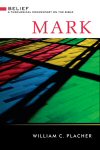
William Placher’s inaugural volume in this exciting series offers theological perspectives on what most scholars believe to be the earliest Gospel—the Gospel of Mark. The result is an accessibly written theological commentary focusing on the questions that Mark’s Gospel raises for us today. This is sure to be of immense value for all who want to hear the astonishing story Mark tells about “the good news of Jesus Christ” (Mark 1:1).
William C. Placher (1948–2008) was Charles D. and Elizabeth S. LaFollette Distinguished Professor in the Humanities and chair of the Department of Philosophy and Religion at Wabash College in Crawfordsville, Indiana. In 2002, the American Academy of Religion named him the best teacher in the country.
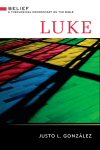
Historian and theologian Justo González presents the beloved Gospel of Luke, who heralds Jesus’ birth as “good news of great joy for all the people” (Luke 2:10). González guides us and challenges us to ask, “What is the meaning of this text for us today?” The result is an engaging and important theological discussion of Luke’s Gospel and its relation to the life and proclamation of the church and its members.
Justo L. González is a respected theological writer and scholar. Among his many works are the classic texts A History of Christian Thought and The Story of Christianity, as well as Essential Theological Terms and The Westminster Dictionary of Theologians.
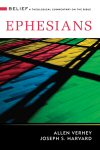
Long recognized as a significant theological document and one from which the Christian church gains life and direction, the book of Ephesians focuses on Jesus Christ’s amazing work in redemption and reconciliation. It invites—and requires—our participation. Jointly written by a theological seminary professor and an active pastor, this commentary emerges from an adult Sunday school class on Ephesians they taught together, as well as their own studies and experiences. The result is a fascinating work that focuses on the Gospel of Jesus Christ and the ways it is to be lived out in the church and by Christians in their own lives.
Allen Verhey is professor of Christian ethics at Duke Divinity School. He has published a number of books and articles, including The Great Reversal: Ethics and the New Testament and Reading the Bible in the Strange World of Medicine.
Joseph S. Harvard is pastor of First Presbyterian Church in Durham, North Carolina. He is a former president of Durham Congregations in Action, and he has received a number of special awards throughout his ministry.
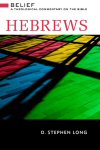
The book of Hebrews is a fascinating extended sermon that has nurtured and challenged the church for centuries. It stands in tension with our sensibilities but provides guidance for the church’s life and for individual Christians. In this theological commentary, D. Stephen Long explores this captivating book. He finds Hebrews extremely relevant for today, as it integrates doctrine, ethics, and politics while helping faithful Christians find their ways through troubled times. It invites us into a robust world beyond the assumptions of today’s scientific worldviews. Hebrews also helps us understand how to read Scripture after the triumph of Jesus Christ. Long’s expert theological guidance helps us understand Hebrews and hear its message for our contemporary world.
D.Stephen Long is professor of systematic theology at Marquette University. He is the author of a number of books, including John Wesley’s Moral Theology: The Quest for God and Goodness; Speaking of God: Theology, Language, and Truth; and Christian Ethics: A Very Short Introduction.
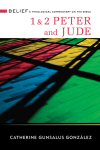
Theologian and church historian Catherine Gunsalus González studies three often-overlooked books in the New Testament, 1 and 2 Peter and the Letter of Jude. These writings from the late first century or early second century helped guide the young church as it faced a variety of issues, both internal to the church’s life and external in the social and political culture in which it was growing. The letters help us focus on the character of the church and the importance of congregations in the church’s ongoing life. They raise basic issues of authority for how the church knows the directions to follow, how Christians should live, and how diverse views should be considered. González uses a variety of resources to illuminate these letters. She very helpfully centers on their theological importance for contemporary churches and for Christian living.
Catherine Gunsalus González is professor emeritus of church history at Columbia Theological Seminary. She is the author of numerous articles. Her books include (with Justo L. González) Heretics for Armchair Theologians.
This title is included in the following collections
You can save when you purchase this product as part of a collection.
Belief: A Theological Commenta...
$450.79$215.99Logos 7 Methodist & Wesleyan P...
$1,499.99$1,499.99Theological Commentary Collect...
$2,459.52$1,719.992025 Preacher Diamond Library
$2,999.99$2,249.99
- $2,999.99$2,249.99
- $2,999.99
- $4,749.99$3,562.49
- $4,749.99
- $4,749.99
- $4,749.99
- $10,999.99$8,249.99
- $11,399.99
- $23,999.99$17,999.99
- $21,749.99
- $24,999.99
About the Editors
William C. Placher (1948–2008) was Charles D. and Elizabeth S. LaFollette Distinguished Professor in the Humanities and chair of the Department of Philosophy and Religion at Wabash College in Crawfordsville, Indiana. In 2002, the American Academy of Religion named him the best teacher in the country.
Amy Plantinga Pauw is Henry P. Mobley Jr. Professor of Doctrinal Theology at Louisville Presbyterian Theological Seminary. She lectures internationally on historical theology as well as contemporary issues and serves on the editorial board for the Columbia Series in Reformed Theology.
Reviews
2 ratings

Jason Clapper
5/5/2015
Bobby Terhune
10/18/2013